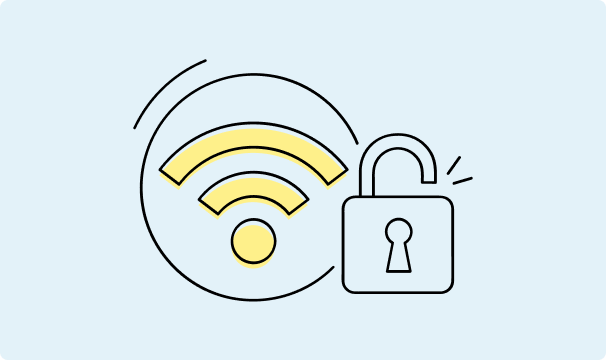How to Bypass WiFi Restrictions: A Comprehensive Guide
Wi-Fi networks are all about user convenience. No one wants to use cables for internet connection anymore. While wireless setups are beneficial, they carry risks if Wi-Fi is managed improperly.
That's where Wi-Fi restrictions come in. It's a way for a network administrator to tackle performance and security problems by preventing unauthorized access, limiting bandwidth, and making a list of blocked sites.
Unfortunately, such restrictions may be imposed without regard for your convenience. This article is a guide on how you can take matters into your own hands, and bypass blocked websites if needed.

Adomas Šulcas
6 min read

Understanding Wi-Fi Restrictions
You can tell a Wi-Fi connection is restricted if there is some blocked content you can't access. Most often, it's imposed by companies, schools, or other network owners.
Wi-Fi restrictions differ from national-level internet connection blocks because your IP address isn't censored by an Internet Service Provider (ISP) with authority from the government. Wi-Fi restrictions work locally.
Most network restrictions involve configuring a Wi-Fi router to limit internet traffic, which can be done by a network admin or, in some cases, an ISP, which provides the WLAN device.
Sometimes, device-level restrictions are also included in the category of Wi-Fi blocks. They are imposed using antivirus, network security, or parental control software.
The general aim is to protect the network or its owner by limiting the freedom users have. More specific goals vary by the size and purpose of the network but often are intertwined.
An office Wi-Fi, for example, might have a list of blocked websites to improve network security from malware or cyberattacks. The same blocked content may also help to increase the performance of the network.
Services like video streaming or social media require a lot of bandwidth, which is better used for work-related purposes. At the same time, management might expect improved productivity by restricting such internet traffic.
A more straightforward case is where certain blocked websites are a cause for legal concern. Schools, for instance, are required by law to block content potentially harmful to children.
Why Bypass Wi-Fi Restrictions
It's undeniable that internet traffic restrictions play an important role in protecting Wi-Fi networks. But it also enables the network owner to decide on your behalf what content you can access.
If you're at least a bit tech-savvy, you can only lose from blocked content. Restrictions are more beneficial for Wi-Fi network owners and administrators than for users.
If you are willing to take full responsibility for the risks, you should be allowed to enjoy unrestricted internet access. The only way to make it happen is to learn to bypass internet restrictions yourself.
Methods to Bypass Wi-Fi Restrictions
Setting up CometVPN to Bypass Wi-Fi Restrictions
Virtual Private Networks (VPNs) establish an encrypted digital connection between your device and a remote server. As a result, your personal data is protected, and your IP address is masked with that of a VPN server.
Such a connection allows you to bypass various internet traffic restrictions, including the ones imposed on your Wi-Fi. CometVPN is an exceptional choice for such a use case. Setting it up takes only a few steps.
- Download CometVPN on your phone (Android, iOS) or PC
- Sign up for a plan
- Choose one of the many servers to bypass internet restrictions
With CometVPN, your network administrator or ISP will only see you connect to a server abroad, making it nearly impossible to limit your Wi-Fi access.
In case a VPN IP address is restricted, you must have the option to switch to another. So, having a reliable provider with truly global coverage and high speeds is crucial.
It all takes a couple of clicks within the CometVPN app. It's by far the most efficient way to access blocked websites and services over WI-Fi.
Web Proxies
Proxies function quite similarly to VPNs, except your data is less safe due to a lack of in-built encryption. They act as simple intermediaries routing your traffic to a proxy server in another country.
There is no supplementary software to make the process more convenient. You'll have to manually set up a web proxy in your browser or operating system. It's a benefit for many use cases, but bypassing Wi-Fi restrictions isn't one of them.
Some proxy server IPs might be restricted on your Wi-Fi network as well. You'll need to switch proxy servers manually or use additional software to connect successfully.
Still, as with VPNs, a web proxy creates an opportunity to access blocked websites by changing your IP address. If you're using a web proxy server already, it's a reasonable option to bypass Wi-Fi restrictions.
Tor browser
Tor browser is open-source software that encrypts your internet traffic and routes it via a decentralized network of volunteer devices (Tor relays). It's primarily used to ensure privacy and access the dark web.
Anyone who wants to spy on you will only see a connection from the Tor network instead of your original IP address. The same applies to those who want to impose Wi-Fi restrictions.
Tor is a great first try to bypass internet restrictions simply because it won't cost you anything, and it's as easy as downloading a browser. But there are a couple of caveats to know.
Using the Tor network significantly slows your internet. Some websites might not even work while using the Tor browser.
Also, Tor relays are public and often among the blocked content over Wi-Fi. Tor browser doesn't guarantee you will bypass restrictions, but if it works, it's hard to justify other solutions.
URL Shorteners
You might not even need to change your IP address to bypass internet restrictions. Some Wi-Fi restrictions use a list of blocked pages that don't include shortened URL versions.
So, instead of using the full name of a blocked website, you can simply shorten the URL to access blocked websites. It takes minutes to implement, and there are multiple online tools available.
The network owner or the ISP might still see what websites you visit and block them or use other means of Wi-Fi restriction. They can also see that you are using a URL shortener and block it too.
Thus, it's more of a temporary solution that doesn't ensure much privacy.
Alternate DNS servers
Domain Name System (DNS) servers translate a domain name, such as cometvpn.com, into an IP address. Essentially, it's like a phonebook allowing you to remember website names instead of strings of numbers.
Changing the DNS server might help you overcome Wi-Fi restrictions if the blocks are implemented only based on one system. Switch to another DNS server and see if blocked content is now accessible.
Cloudflare (1.1.1.1) and Google Public (8.8.8.8) are two of the most popular, but many others work too. Changing your DNS server is quite simple and can be done on any device via network settings. Here's how to do it on a Windows 11 PC:
- Enter Settings
- Open Network & internet
- Select Wi-Fi and find your current network
- Edit DNS server assignment settings
- Choose manual and enter the IPv4 or IPv6 DNS server IP address
SSH tunnels
SSH (secure shell) tunneling is primarily used for secure port forwarding on the application level. Instead of connecting directly, it establishes a connection (tunnel) that passes encrypted data from one port to another.
For reasons of accessing blocked sites, it functions quite similarly to a proxy server and a VPN. Since your browsing data is encrypted and routed via an SSH tunnel, Wi-Fi restrictions cannot be imposed.
Unlike VPNs and proxies, SSH tunnels require you to set them up yourself on your home network. In practice, this is an option only for the most tech-savvy users.
Conclusion
Every method of how to bypass wifi restrictions can be useful in certain situations. A good rule of thumb is to try the most simple solutions first, such as shortening the URL or changing the DNS server. If you want a universal solution with less headache, just go with a VPN service.
How do I bypass Wi-Fi restrictions without a VPN?
If you don't have easy access to a VPN, your next best options are Tor browser, URL Shorteners, and alternate DNS servers. They have somewhat limited applicability, but it's definitely worth a try.
A proxy server or an SSH tunnel can be an option too when you already own them. But setting them up just to access blocked websites can be expensive and complicated, so it's better to invest in a VPN instead.
How do I bypass Wi-Fi restrictions on a phone?
Every method mentioned above can be used to bypass internet restrictions on a smartphone. CometVPN app, for example, is compatible with all Android and iOS devices. The same goes for the Tor browser and services that shorten URLs.
Setting up a proxy or an SSH tunnel on a phone might be a bit more tricky. It may require you to change your smartphone settings and use third-party apps that will help route your internet traffic.
Does VPN bypass parental controls?
Yes, a VPN can overcome parental controls, although there are some exceptions. Most such restrictions rely on blocking IP addresses. A VPN is effective for accessing blocked content because it routes traffic through an encrypted tunnel.
Some parental control solutions rely on other functions, such as device usage time limitations, remote management, or monitoring. Depending on the setup, a VPN might not bypass such controls fully or at all.

Author
Adomas Šulcas
Chief Operating Officer at Growth Bite
Adomas is a technical writing expert who founded Growth Bite, a digital marketing company, focused on providing high-value SEO and content marketing services to SaaS companies.
Related articles
4 min read
Ethernet vs Wi-Fi: Which One is Better?
Ethernet and Wi-Fi are the two main ways to connect your computer to the internet. While Wi-Fi has received significantly more attention in recent years, especially among consumers, due to its simplicity and flexibility, ethernet is still widely used in various other applications.
Even if Wi-Fi is significantly more popular, it isn’t strictly better. Both methods have their benefits and drawbacks. Wi-Fi’s popularity comes from its ease-of-use and flexibility, but an ethernet connection can be much more useful in certain scenarios.

Adomas Šulcas

5 min read
How to Change Chrome Proxy Settings: The Ultimate Guide
A proxy server is an easy alternative to a VPN that can perform most of the functions of the latter. It’s a server that stands between your device and the destination server, taking your connection requests and forwarding them in your name.
Destination servers in almost all cases see the proxy server as the originator of the request. As such, proxies are widely used in various, mostly business-related applications whenever privacy, security, location changing, and several other factors are at play.

Guoda Šulcaitė